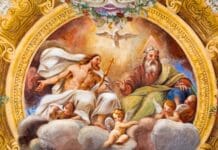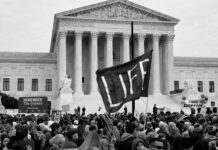One of the most well known hallmarks of the Catholic Church is the priestly honorific: father. We are accustomed to calling our priests father, and even address the pope as Holy Father. Where did this tradition that some say is in opposition to Scripture come from?
As Catholics, we call our priests father not in the biological sense, but the spiritual, acknowledging the diverse roles they play as a shepherd to the children of God meeting the spiritual needs of their flock.
Through ordination, priest are charged with the office of speaking for the Church, ministering the sacraments, and proclaiming the Gospel. When the priest speaks the Word of God in persona christi at the Eucharist, they feed the family of God and provide the spiritual food necessary for eternal life.
“I am the living bread that came down from heaven; whoever eats this bread will live forever; and the bread that I will give is my flesh for the life of the world. Just as the living Father sent me and I have life because of the Father, so also the one who feeds on me will have life because of me.” – John 6:51,57
Reconciling penitents during confession, overseeing proclamations of marital vows, anointing the sick or dying, and welcoming new members into the Body of Christ through baptism all are duties of the priest in their role as spiritual fathers.
This tradition of showing respect for the duties of the priest as spiritual fathers has it roots in the earliest days of the Church. In the first New Testament book ever written around the year 52 A.D., Paul the Apostle refers to himself as a father to the Thessalonians.
“As you know, we treated each one of you as a father treats his children, exhorting and encouraging you and insisting that you conduct yourselves as worthy of the God who calls you into his kingdom and glory.” – 1 Thessalonians 2:11-12
In his first letter to the Corinthians, Paul the Apostle again insists upon being a spiritual father to those of the church at Corinth and proclaims Timothy his spiritual son.
“Even if you should have countless guides to Christ, yet you do not have many fathers, for I became your father in Christ Jesus through the gospel. I am sending you Timothy, who is my beloved and faithful son in the Lord;” – 1 Corinthians 4:15,17
In his first epistle, John the Evangelist shows us priests were referred to as father in the earliest days of the Church.
“I am writing to you, fathers, because you know him who is from the beginning.” – 1 John 2:13
Addressing priests are spiritual fathers was used by the Apostles in their writings and early Church leaders was an adaption of the Jewish tradition of referring to elders as father.
“My brothers and fathers, listen. The God of glory appeared to our father Abraham while he was in Mesopotamia,” – Acts 7:2
“My brothers and fathers, listen to what I am about to say to you in my defense.” – Acts 22:1
We have one of the earliest traditions in the Church to thank not only for our priestly honorific, but the papal as well. Until around the year 400, a bishop was called papa, much in the same as a priest would be called father. This title was eventually reserved for the Bishop of Rome, in English called the pope. The first recorded usage of papa as father is found in a letter written by Pope Dionysus of Alexendria (reigned 248 A.D. to 264 A.D)
“τοῦτον ἐγὼ τὸν κανόνα καὶ τὸν τύπον παρὰ τοῦ μακαρίου πάπα ἡμῶν Ἡρακλᾶ παρέλαβον.”
“I received this rule and ordinance from our [blessed father]/pope, Heraclas.”
When monastic orders developed, another tradition developed to call leaders abbot or abbess. The word is derived from the Aramaic for father, ’abbā, but in the more familiar sense of “daddy.” Later on in the Middle Ages, mendicant friars, like the Franciscans and Dominicans, were also called father since by their preaching, teaching, and charitable works they cared for the spiritual and physical needs of all of God’s children.
Some might say this tradition is in opposition to Sacred Scripture, as Christ commands us to call no man rabbi, father, or master.
“Call no one on earth your father; you have but one Father in heaven.” – Matthew 23:9
When read in the context of His teaching, its clear Christ was exposing the behavior of the scribes and Pharisees who desired to honored publicly, with their three most favorite titles being rabbi, father, and master.
“Jesus is not forbidding us to call men “fathers” who actually are such—either literally or spiritually. To refer to such people as fathers is only to acknowledge the truth, and Jesus is not against that. He is warning people against inaccurately attributing fatherhood—or a particular kind or degree of fatherhood—to those who do not have it.”
Photo credit: SosnaRadosna / Shutterstock.com


















Thank you for many useful quotes and insights. It is useful, I think, also to point out that the term “teacher” was also forbidden by Jesus, but then this title was officially recognized in 1 Cor 12: 27-31 in the context that “we are Christ’s body.” In other words, after Pentecost, Jesus continued to minister through the Church in various roles. This was accomplished by the Holy Spirit. Thus, the role of shepherd, and father continued after Pentecost in the Church.
OH LORD MY FATHER, PLEASE GRANT US SPEEDY APPROVALS IN OUR APPLICATIONS. WE PRAY THROUGH JESUS CHRIST OUR LORD, AMEN.